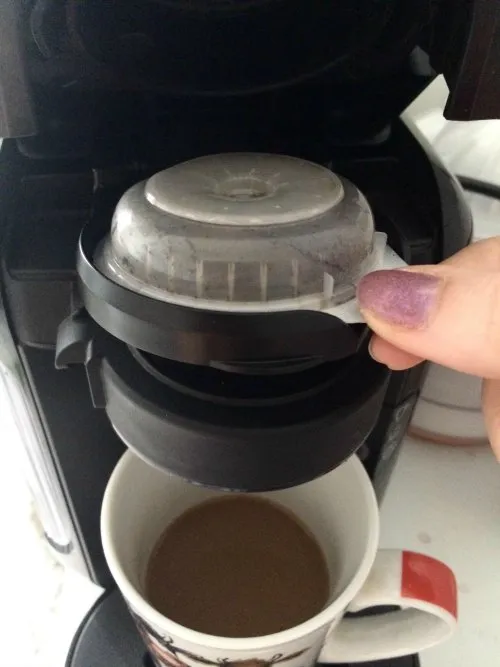Coffee coffee makes you urge to poop because it contains caffeine, which is a stimulant. Besides increasing energy, caffeine can also trigger intestinal and colon muscles, which leads to easy bowel movements. In particular, caffeinated coffee contains high acidity and particular compounds like chlorogenic acid, caffeine, and N-alkanoyl-5-hydroxytryptamine.
A survey revealed that caffeinated coffee has more impact (23%) than decaffeinated one (29%), felt the need to poop fast in only 4 minutes. When you take coffee, you activate two hormones: gastrin and cholecystokinin, to initiate the gastrocolic reflex. From this gut-brain connection, 63% of the women feel the need to take a poop because of having taken a cup of coffee.
In this guide, we will discuss why coffee makes you poop and how to stop coffee from making you poop. First, let’s start with why coffee makes you poop occasionally when you drink it.
Caffeine Can Activate Your Colon
Among all the sources of caffeine, coffee remains the most specifically popular and widely consumed product in the world. Furthermore, drinking a cup of coffee enables you to take 95mg of caffeine into your body. This activates your colon and triggers bowel movements, causing your colon and intestines to have muscle contractions.
It moves the stool closer to the rectum, while caffeine stimulates colon activity 60 percent more compared to water and 23 percent compared to decaffeinated coffee. Strikingly, research shows that even decaffeinated coffee can stimulate bowel activity, suggesting that coffee makes a contribution of other chemicals.
Coffee is a simulator of hormones, such as the secretion of gastrin and cholecystokinin (CCK). This helps transport foods within the colon and gut, hence enhancing colonic movement.
The morning intake also shows to significantly raise the post-ingestion level of gastrin by drinking both types of coffee, which amplifies digestive processes.

Decaf Can Also Make You Poop
It is thought that two compounds in coffee, chlorogenic acids, and N-alkanoyl-5-hydroxytryptamides are responsible for stimulating stomach acid secretions, effectively giving food a jump start, so to speak. The faster it is moving in the stomach lining, the faster it has passed to the intestines.
Coffee also activates the gastrocolic reflex, the one that sets off colonic contractions whenever you eat or drink. There’s no denying that coffee’s not a meal, but it can have you running to the bathroom to answer a call of nature, particularly in the morning.
At present, the exact mechanism of action involved in this influence that coffee wields over bowel movements is unknown and requires further research from professionals.
Dairy in the Form of Milk or Cream May Speed Things Up
Freshly brewed coffee is free from all kinds of artificial ingredients or preservatives. However, over two-thirds of Americans like to stir in milk, cream, sweeteners, sugar, or other additives to drink coffee.
Milk and cream in a diet may increase bowel movements since they contain lactose. Close to 65% of people globally cannot properly digest lactose.
People who are lactose intolerant experience bloating, stomach cramps, and in some, diarrhea shortly after consuming dairy. This means more research shows that for a person suffering from lactose intolerance, chewing gum with lactose can elicit the urge to poop.
Does Coffee Make Everyone Poop?
No, it doesn’t affect everyone. A study of 92 adults showed that 29% of them experienced a bowel movement after drinking coffee. Coffee does have a laxative effect on your body by kick-starting the reaction of your digestive system, while studies have shown that this effect is more predominant in people with IBS and older adults with intestines more sensitive to such stimuli.
Regular coffee drinkers may have somewhat less of this symptom. Results showed most people had increased motility index within four minutes of drinking coffee, both regular and decaf coffee, which persisted for at least 30 minutes. Six out of fourteen respondents, however, did not exhibit this reaction.
How to Stop Coffee From Making You Poop (and Avoid Diarrhea)

1. Choose the Right Roast
Go for darker roasts since they tend to have much lower caffeine levels. This makes them less stimulating for your digestive system.
2. Choose Decaf or Low Caffeine
You also can prevent the need to defecate by taking decaffeinated coffee or coffee with the least level of caffeine. This reduced the probability of getting a coffee-induced bowel movement, meaning you can take your coffee in the morning without the consequences.
3. Avoid Dairy or Creamers
Dairy products and other creamers can amplify your stomach’s state of digestive health. You may want to try some of one-third of the many non-dairy options for your food and beverages.
4. Avoid Artificial Sweeteners
Coffee together with artificial sweeteners tends to upset the stomach even more as it contributes to its laxative properties. Better opt for natural sweeteners instead; they do not affect the stomach a lot just like in this case Stevia.
5. Stay Hydrated
Drinking water during the day and sleeping will enable you to balance the dehydrating impact that caffeine has. All this further assists in minimizing the disruptions of the digestive system that an individual is bound to experience from the acid production of coffee.
6. Minimize Your Consumption
Reducing the amount of coffee you intake in a day might cut down this effect. Maybe try to do it slowly if, for you, it seems true that the bowel movement-triggering effect of coffee is likely, and if it makes any difference to the cause of bowel movements in your case.

Does the Type of Coffee Make a Difference?
If you’re concerned about the effect of coffee on certain health conditions via the gut health and digestive system, the type of coffee does matter. The roast level, caffeinated content, and additives, such as dairy/sugar/sweeteners, affect the way it interacts within the body.
Conclusion
Being informed of what causes coffee-induced bowel movements can just give you the freedom to enjoy the benefits of your coffee. Darker roasts, decaf or low caffeine content, dairy, and artificial sweeteners in moderation, with good hydration and proper intake, can lessen the effect of coffee on your bowel. Try out these techniques to determine which works well on your body while still enjoying your cup of coffee minus the side effects.









